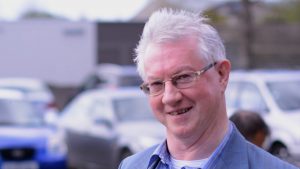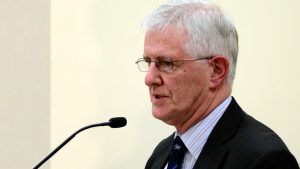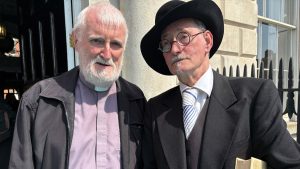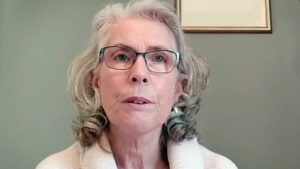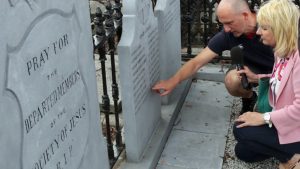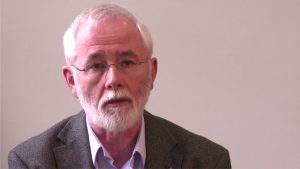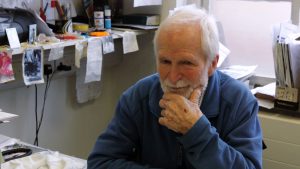Newman’s liberal education: useful or useless?

‘Useful or useless? John Henry Newman’s vision on a liberal education for today’ was the title of a lecture by Newman scholar Professor Ian Ker, Oxford University, in the George Moore Hall, University College Dublin, on Wednesday 9 October, 2019. His talk was followed by a panel discussion on the topic with guests Kathleen Lynch, educationalist and Professor Emeritus UCD, Joanna Siewierska, President of the UCD Students Union, and Daire Keogh, historian and Vice President of Dublin City University.
The event was organised by Leon O’Giollain SJ, and his fellow UCD chaplains with the assistance of Pat Coyle of Irish Jesuit Communications. A large number attended the event, including a number of Leon’s fellow Jesuits and co-workers.
Teresa Iglesias, former UCD Professor of Philosophy, introduced Ian Ker, who received a warm welcome from those attending. She described him as the author of the definitive biography of Newman as well as the editor of critical editions of a number of Newman’s works.
In his talk, Professor Ian Ker was keen to dispel the notion that Newman was only interested in a Victorian gentleman’s education centered on literature and the classics. “What Newman means by a ‘liberal education’ has been much understood,” he said. “Newman was not speaking about the reading of lots of books in the field of the liberal arts, literature, and music.” Rather, said Ker, what most concerned Newman was that university education would be focussed on the ‘training of the mind’ so that the student would learn to think and reason well. He emphasised also that whilst being able to think clearly and precisely was important, this training of the mind for Neman was not just about logical reasoning but also about eloquence (hence involving the imagination) and the ability to make sound judgments. In essence, a liberal education should produce a ‘cultivated mind’.
Though Newman did believe in his day that the classics were the best mode of access to developing this critical or cultivated mind, what he was ultimately trying to oppose was the learning of facts, especially by rote. “Newman was interested in any subject that could help the student to think.” And it was in this sense that Professor Ker wished to say that Newman remained relevant today even though the curricula and vocational structure of universities were greatly changed from Newman’s time.
Professor Ker’s contribution allowed for the cork to be opened on a variety of issues relating to third-level education today, particularly and not surprisingly, in UCD. In the follow-up panel discussion chaired by TV presenter Mick Peelo of RTE, the commodification of the university, anti-catholic bias, diversity and tolerance, vested interest groups, student poverty and much more came up for discussion.
Student President Joanna Siewierska was grateful for the fact that what was on offer for students was indeed a wide variety of curricular and post-curricular activities and an interdisciplinary educational experience. But she bemoaned the fact that many students could not avail of this as they were forced to work to pay fees and cover their keep whilst studying and so missed many of the benefits that a broad educational structure offered them.
Kathleen Lynch voiced many concerns but drew attention in particular to the role that commercial considerations play in dictating how a university develops. “Knowledge can’t be governed by vested interests,” she said, “and today we are dominated by a commercial view of what is knowledge… We are beholden to the professions; universities are driven by them, and many of these professions are hand in glove with commercial entities and this works to the detriment of the students.” She said universities needed to develop and sustain an ‘ethics of care’ for all its students and in particular minority groups like travellers and black students.
Daire Keogh noted, however, that universities need funding if they are to thrive and serve their students well. He asked the question, “Where is the money going to come from? The taxpayer?”
He said that for him Newman was talking about the development of empathy and resilience. And he added it was the duty of universities to develop graduates who had these qualities and could bring them to bear on the future challenges of the 21st century.
Responding to the question ‘would Newman be proud of UCD today?’ he replied that speaking as a former graduate he would absolutely say ‘yes’. The challenges were different for universities nowadays he said, citing the fact that the combined total of the third level student population of Dublin today was larger than the whole population of Dublin in Newman’s day. Nonetheless, UCD in his opinion gave him the type of education that Newman envisaged in terms of cultivating the ‘critical mind’.
When a contributor from the floor questioned why UCD had originally planned not to send official representation to Cardinal Newman’s canonisation in Rome and only relented late in the day there was a large round of applause from the hall for Daire Keogh’s response. “They changed their mind and should be given credit for it. Newman would have thoroughly approved of someone exercising their ability to change their mind.”
Leon O’Giollan concluded proceedings by thanking all involved, especially the audience who engaged warmly with the topic.
The second Newman-related event organised by the UCD chaplains is a pilgrimage to Rome with 12 students who will spend four days there before attending his canonisation ceremony on Sunday 13 October in St Peter’s Square, when Pope Francis will declare him a saint.






